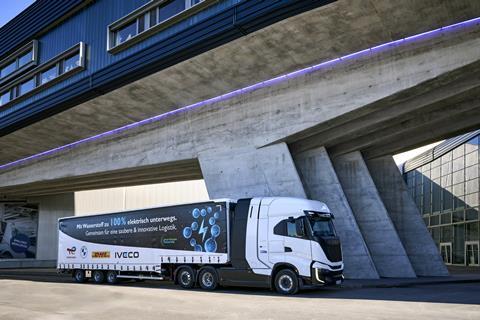
BMW Group has introduced two Iveco S-eWay Fuel Cell lorries into its logistics network, testing the feasibility of hydrogen-powered freight transport. The trucks will operate on routes between Leipzig, Landsberg, and Nuremberg, transporting goods as part of BMW’s decarbonisation efforts in logistics.
To support the trial, two new hydrogen refuelling stations have been built in Leipzig and Hormersdorf. The stations, constructed by TotalEnergies and operated by TEAL Mobility—a joint venture between TotalEnergies and Air Liquide—are open to third-party fleets rather than being reserved solely for BMW’s logistics operations. BMW confirmed that the hydrogen used in Leipzig must be at least 50% green hydrogen, as required by the German Ministry for Digital and Transport’s funding criteria.
“In global logistics, it is important to select the right means of transport in order to operate in a future-oriented and efficient manner,” said Michael Nikolaides, head of production network and logistics at BMW Group. “For the first time, hydrogen-powered trucks will now be used in serial operation for German automobile production.”
The Iveco S-eWay Fuel Cell truck is a pre-series model designed for long-haul transport. It has a range of up to 800km, can carry up to 24.7 tonnes of payload at a 44-tonne gross combination weight, and stores up to 70kg of hydrogen at 700 bar. Refuelling takes less than 20 minutes. The fuel cell system is supplied by Bosch.
When asked by Freight Carbon Zero about operating cost, BMW confirmed that hydrogen trucks are not yet on a par with diesel.
“With the current hydrogen price, it is not yet cost-competitive with diesel, but a significant price decline is projected towards 2030,” a BMW spokesperson said.
The introduction of fuel cell trucks is part of BMW’s wider decarbonisation strategy in transport logistics. Alongside the H2Haul project, the company is also testing hydrogen combustion engine trucks under the HyCET project. The initiative includes the deployment of two 40-tonne trucks and one 18-tonne truck, with support from DHL, Volvo Trucks, Deutz, KEYOU, and TotalEnergies. The project is backed by funding from the German Federal Ministry for Digital and Transport.
Hydrogen is also playing a role in BMW’s Leipzig plant, which operates over 200 hydrogen-powered industrial trucks. The site has five hydrogen refuelling stations, and its paint shop is gradually transitioning to hydrogen-capable burners to reduce reliance on natural gas.
BMW is also preparing to launch its first hydrogen-powered production vehicle in 2028, offering a fuel cell drivetrain option within an existing model. The company sees hydrogen fuel cell technology as complementary to battery-electric vehicles, plug-in hybrids, and internal combustion engines within its broader portfolio.













